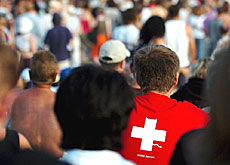Press blame Right for swaying citizenship votes

The press has blamed negative campaigning by the rightwing Swiss People’s Party for this weekend’s ballot-box rejection of proposals to ease citizenship restrictions.
Newspaper editorials also reflected on the difference of opinion between voters in French- and German-speaking parts of the country.
On Sunday voters rejected government-backed plans to simplify naturalisation procedures for second-generation foreigners.
They also turned down a proposal to grant children born in Switzerland to foreign parents the automatic right to a Swiss passport.
The Geneva-based “Le Temps” said the People’s Party, which published controversial campaign posters showing dark-skinned hands grabbing at Swiss passports, had succeeded in scaring the electorate into voting against the plans.
“The other parties in government… reacted too late to the People’s Party’s detestable propaganda,” the paper said in its front-page editorial.
“The main lesson and the biggest concern for the future are the role and methods adopted by [this] party.”
“No victory”
The Zurich-based “Tages-Anzeiger” said the outcome of Sunday’s votes was “no victory for Switzerland”.
“What was a reasonable proposal has been buried single-handedly by the People’s Party,” commented the paper, adding that the three other main parties in government – the centre-left Social Democrats and the centre-right Radicals and Christian Democrats – should have done more to counter the “no” campaign.
The tabloid “Blick” argued that the rejection of both citizenship proposals had succeeded in opening a “rift between Swiss citizens and foreigners which does not reflect the true picture”.
There are approximately 1.5 million foreigners living in Switzerland – around 20 per cent of the population.
Britain’s “Independent” said voters “appeared to have been persuaded by some rabidly xenophobic propaganda from the ‘no’ campaign”.
“Nearly a year after the… People’s Party topped the polls in a general election, voters have again endorsed its anti-immigration stance,” the paper added.
For the “Financial Times”, the rejection of both proposals “demonstrated the power… of the People’s Party”. It described the party’s populist campaign against the votes as “well-funded and highly conspicuous”.
Linguistic divide
The citizenship votes were split along linguistic lines, with nearly all French-speaking cantons accepting the changes, while German-speaking regions turned them down.
According to the FT, Sunday’s votes illustrated the “cleft between Switzerland’s relatively liberal French-speaking west and its more conservative, German-speaking east”.
Several papers agreed that Sunday’s votes were proof of the existence of the “Röstigraben” – the imaginary barrier between French- and German-speaking Switzerland.
The “Neue Zürcher Zeitung” suggested that the two language regions were more divided this weekend than they had been at any time since the mid-1990s.
“French-speaking Swiss voted in a more foreigner-friendly way than the country as a whole… this has to do with the fact that they are a minority themselves,” commented the paper.
“People in the French-speaking language region are in general more willing to integrate people from other cultures.”
Maternity benefit
While both citizenship votes were rejected at the ballot box, a proposal to introduce nationwide statutory maternity benefits was passed by a majority of more than 55 per cent.
A provision for maternity pay has been enshrined in the constitution for half a century, but three previous attempts to introduce statutory benefits failed to win the support of voters.
The “Tages-Anzeiger” described the vote as the moment when Switzerland finally caught up with other western European countries.
“After more than 100 years of debate and three ballot-box rejections, voters have come out in support of paid maternity leave. This really is a reason to celebrate.”
The “Basler Zeitung” said the vote proved that the electorate now recognised that “many well-educated women no longer see their duty in life solely in terms of cooking, cleaning and bringing up children”.
“One thing is sure,” commented the Lausanne-based “24 Heures”, “and that is that yesterday, women won an important battle.”
swissinfo, Ramsey Zarifeh
Two votes on easing citizenship restrictions for young foreigners were thrown out on Sunday by 56.8% and 51.6%.
55.4% of voters approved statutory maternity benefits for working women.
50.2% rejected plans to prevent closure of 800 post offices.
Voter turnout: 53%.

In compliance with the JTI standards
More: SWI swissinfo.ch certified by the Journalism Trust Initiative










You can find an overview of ongoing debates with our journalists here . Please join us!
If you want to start a conversation about a topic raised in this article or want to report factual errors, email us at english@swissinfo.ch.